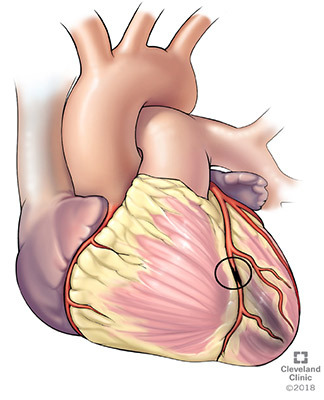What is myocardial ischemia?

Myocardial ischemia means your heart muscle is not getting enough blood (which contains oxygen and nutrients) to work as it should.
What are symptoms of myocardial ischemia?
The most common symptom of myocardial ischemia is angina (also called angina pectoris). Angina is chest pain that is also described as chest discomfort, heaviness, tightness, pressure, aching, burning, numbness, fullness, or squeezing. It can feel like indigestion or heartburn.
There are 2 types of angina: stable angina/stable coronary artery disease and unstable angina. Stable angina usually stops soon after you rest or take medication to control it. Unstable angina can happen at any time, even when you are relaxed or sleeping. It may not go away when you take medication.
Symptoms of myocardial ischemia can also include:
- Pain or discomfort in the upper body, including the arms, left shoulder, back, neck, jaw or stomach.
- Trouble breathing or feeling short of breath.
- Sweating or “cold sweat.”
- Feeling full, indigestion, or a choking feeling (may feel like heartburn).
- Nausea or vomiting.
- Feeling light-headed, dizzy, very weak or anxious.
- Fast or irregular heartbeat.
If you have angina or any of the symptoms of ischemia listed above that last for more than 5 minutes, CALL 911 RIGHT AWAY! You may be having a heart attack or have a coronary artery that is completely blocked.
It is possible to have ischemia or even a heart attack and not have any warning signs. This is called silent ischemia. This is most common in people with diabetes, but it can happen to anyone with heart disease.
What causes myocardial ischemia?
Ischemia is most likely to happen when your heart needs more oxygen and nutrients than it is getting. It is simply a supply-demand imbalance that happens at times when there is more demand for blood, such as when you are active, eating, excited, stressed or in the cold, and your body can’t keep up with the need for more blood.
The supply problem can be caused by coronary artery disease. This is a build-up of plaque and cholesterol inside the coronary arteries. The build-up narrows the artery so much that the oxygen-rich blood the heart needs can’t get through, and the heart muscle becomes starved for oxygen. This causes ischemia and angina.
Another cause of myocardial ischemia is coronary spasm. This happens when the coronary arteries spasm, which temporarily reduces or cuts off blood supply to the heart.
What treatments are available for patients with myocardial ischemia?
Your treatment for myocardial ischemia depends on the cause of the problem. Your doctor will talk to you about the treatment that is best for you, which may include medications or procedures to improve blood flow to the heart muscle.